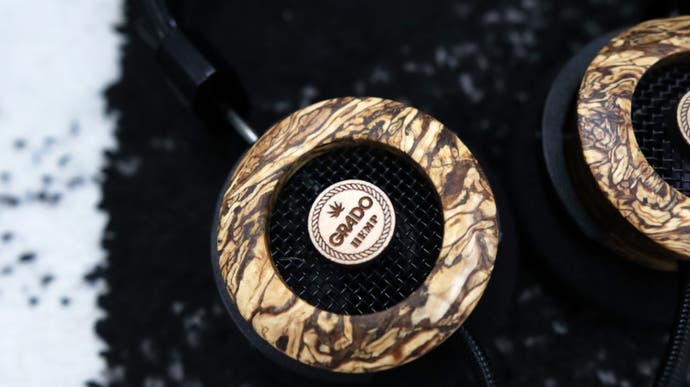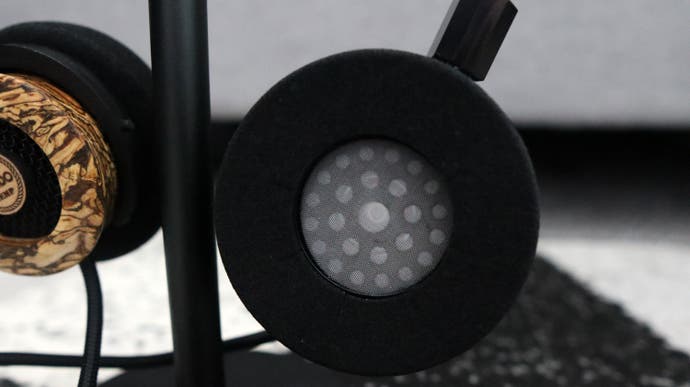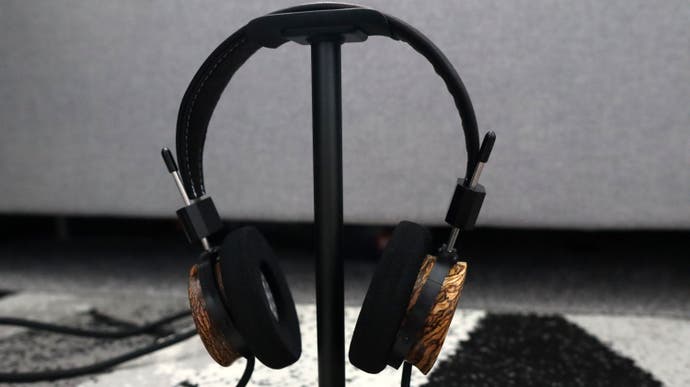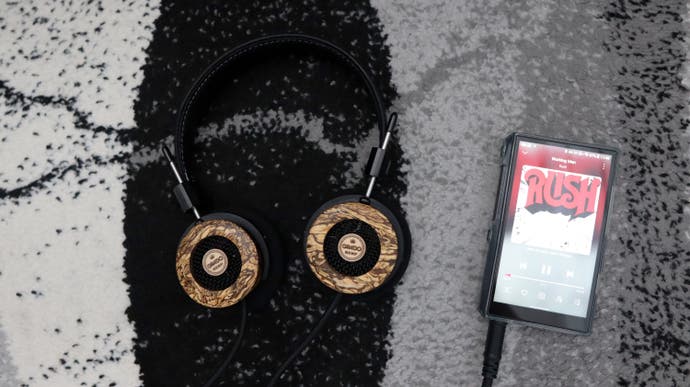Grado Hemp headphones review: material science
Years after debuting as a $420 limited edition, are these worth £439?
Grado made some waves in the headphone world back in 2020 with its limited edition Hemp headphones which, as the name suggested, were made of hemp and maple, combining the warmth of a wood cabinet for audio with a dose of the good stuff. 2024 has seen Grado make the Hemps a permanent part of their range, with an appropriate price - $469 in the USA (up from their previous price at $420), and £439 in the UK. Of course, that's by no means cheap, and it's a lot more than previous Grado models I've looked at, such as the lovely SR325x. I've been using the Hemps for the last few weeks to see if they're worth that higher price.
The Hemps' design is classic Grado - they've got a signature design language when it comes to their headphones which carries through even from their more affordable choices to their top-end options that cost a fortune. They look as if they are more from the post-war period than from 2024, and carry all of the brand's aesthetic choices. That goes for everything from the thinner earpads to the stitched leather (or vinyl from Grado UK) headband that doesn't have much in the way of padding. With these choices, the Hemps rest on your head more than clamp down on your cranium. It makes them comfortable for extended periods, especially with their ridiculously low weight of 218g, although you do have to get their fitment just right to reap the rewards.
If you haven't used a pair of Grados before, it takes some getting used to with their thinner elements across the headband and around the earcups. They can get uncomfortable if not fitted right, and I do wish that Grado would opt for slightly plusher earpads, especially at this price. In addition, the coiled cable is disproportionately thick, dwarfing the tiny jack on the end. This can get in the way a tad when you're deep in your favourite tracks, but it is at least braided.

As much as everything else about the Hemps' design feels quite rudimentary and basic, their use of maple and hemp on the earcups does not. The wood used combines to have this intricate, almost marbled pattern to it, which looks sublime. Run your fingers across it, and you can actually feel the grain, too - you don't get that everyday. The blend of maple and hemp, which is a harder wood than the more commonly-found oak, helps the Hemps to offer a lot of detail and width in their audio. It carries a different feel to other cans that use metal, with a more natural presentation.
In addition, the Hemps are also easy to drive, with just 38 ohms of impedance - meaning you could theoretically pair them with just a vacant headphone jack on a phone or PC. While this works perfectly well, you're better off plugging them into a dedicated DAC that can help make their sound even wider and capture even more detail. It may only be the top of the top end and the real low levels of sub bass, but having a good DAC and high-quality recordings certainly brings the best out of the Hemps.
The thing with the Hemps, as with other Grado cans, is that these are an open back design. This means they let as much noise out as they do in, but it comes with the party piece of them offering marvellous imaging and unrivalled width. It means though that you can only use these at home in a quiet room - ideal for critical listening to your favourite tracks then, but not suitable for the commute.
But now the important bit - sound. The Hemps are unlike any other pair of headphones I've tested. They're natural, wide and just downright gorgeous, whether it's a busy recording with Earth, Wind and Fire's Let's Groove, or a more intimate option such as John Martyn's May You Never. The Hemps deliver some of the richest and most detailed audio available, especially if paired with high-quality recordings and a fantastic DAC or DAP such as the Chord Mojo 2 and mid-range FiiO M11S where they can really stretch their legs.
The low end is robust, as with the SR325x, and arguably more prominent than on other Grados out there. It's deep with plenty of extension, and it made tracks such as Rush's YYZ and the aforementioned Let's Groove feel meaty where they needed to be. With this in mind, the Hemps' low-end isn't so prominent that it's overpowering. It's reasurringly meaty, but not so much that it overtakes the high levels of energy and detail on offer throughout the frequency range.

With this mind, their mid-range presentation and handling of vocals is impressive. Those more intimate tracks from the likes of John Martyn (May You Never), Jack Johnson (Washing Dishes), James Taylor (I Was A Fool To Care) and Jimmy Buffett (Son Of A Son Of A Sailor) reveal a warmth and roundness to the Hemps' sound that was unlike, and arguably better than, other Grado options I've used in the past. It captured all of those tracks' little guitar inflections perfectly, while the Buffett track also allowed the Hemps to demonstrate their fantastic width in the song's introduction with a small ship's bell far off to one side. That was presented with the utmost clarity. The percussion on Gloria Estefan's Get On Your Feet was also crisp and detailed, too - sometimes this can feel a little lost in such a busy track, but that certainly wasn't the case with the Hemps.
The same also goes for the top-end presentation, where tracks such as Steely Dan's Do It Again give the Hemps the chance to demonstrate that fantastic amount of detail. I don't think I've heard the competing percussion intro of this particular Dan track handled with such finesse. For some headphones, it can be a bit of a nightmare given how busy it is, but the Hemps sailed through it. The same also went for the cymbal rides in the instrumental section of Rush's Working Man - sometimes they can come across as harsh, but they were delivered with clarity and smoothness with the Hemps.

Regardless of which area the frequency range you focus on though, the Hemps deliver some of the best, and widest, audio I've heard. Steven Wilson's Impossible Tightrope is an evil track for headphones, with its hypnotic organ work, pounding drums and, at times, erratic strings. It's notoriously busy, and with some cans I've tested, comes across as far too narrow to let the song breathe where it needs to. As is becoming a bit of a theme with the Hemps, it mastered Impossible Tightrope, with lots of breathing space given for the track's individual elements, including SW's vocal. It helped to portray how excellent the Hemps' imaging was too, with sound coming from all angles, as opposed to simply being from left and right.
All of this also combines to make the Hemps a great pair of gaming cans too. In rigging them up to my desktop Chord Mojo 2 and plugging that into my PC and booting into some rounds of CS2, it became clear how potent the Hemps were rather quickly. Their high levels of detail and a marvellously wide soundstage provided some excellent width for hearing footsteps with fantastic accuracy, while heavy gunfire and grenade explosions offered brilliant immersion with the cans' robust low end.
Switching over to Forza Motorsport, that wide soundstage and excellent imaging made it a joy to race other AI or people online as it helped with placing my car alongside others for overtaking, and worked well in tandem with the game's proximity arrows to give me a definite idea where the opposition were on circuit. This also went in some races on Assetto Corsa too, although this time in tandem with a top-down radar mod I installed some time ago.

So, where does all this leave us? Well, it's quite simple really - the Hemps are a majorly excellent set of open back cans. They're rich, detailed and wide, while the combination of maple and hemp helps their fortunes dramatically. It also looks fantastic, while making the Hemps quite unique among its peers. They do come with the usual Grado caveats though of a marmite design that you may like, or find horribly uncomfortable. £439/$469 is a huge amount of money to drop on a pair of headphones after all, so you want something that's going to be the cream of the crop. From my perspective, the Hemps get pretty damn close but won't necessarily jibe with every listener in terms of style and comfort.

